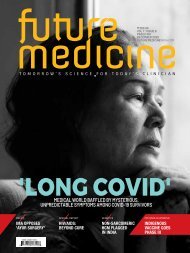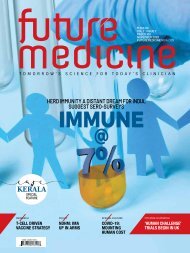FM DECEMBER 2018 ISSUE - digital edition
Create successful ePaper yourself
Turn your PDF publications into a flip-book with our unique Google optimized e-Paper software.
clinical practice<br />
ALLOPATHS PROTEST<br />
‘MYXOPATHY’<br />
Medical bodies oppose states allowing bridge course to AYUSH practitioners<br />
Even as the union cabinet struck<br />
down the bridge course proposed<br />
in the National Medical Commission<br />
Bill for AYUSH doctors, it left it to the<br />
state governments to take necessary<br />
measures for addressing and promoting<br />
primary health care in rural areas.<br />
AYUSH stands for Ayurveda, Yoga,<br />
and Naturopathy, Unani, Siddha and<br />
Homoeopathy -- the traditional forms<br />
of medicine practised in India. The<br />
bridge course was proposed to enable<br />
AYUSH doctors to practice and prescribe<br />
allopathic medicine. The union cabinet<br />
removed the provision from the bill after<br />
a Parliamentary Standing Committee<br />
recommended against making it a<br />
mandatory part of the same.<br />
The parliamentary standing<br />
committee was set up following<br />
objections raised by Indian Medical<br />
Association, the largest body of<br />
allopathy practitioners in India. IMA had<br />
staged nationwide protests and alleged<br />
that the move would promote quackery.<br />
“IMA is against myxopathy and there<br />
is no scope for any mixing. By allowing<br />
ayurveda doctors to practice modern<br />
medicine, you are giving a message that<br />
they cannot treat common illness with<br />
ayurveda,” said Dr. K.K. Agarwal, former<br />
national president of IMA.<br />
Even though the union<br />
government removed the provision<br />
of bridge course from the bill, the<br />
Maharashtra government stated that<br />
it would continue with a bridge course<br />
started for homeopathy doctors to<br />
enable them to practice allopathy.<br />
Maharashtra government started a<br />
one-year certificate course of Modern<br />
Pharmacology in 2016 to train<br />
homeopathy doctors in certain areas<br />
EVEN THOUGH THE UNION<br />
GOVERNMENT REMOVED<br />
THE PROVISION OF BRIDGE<br />
COURSE FROM THE NMC<br />
BILL, MAHARASHTRA SAID<br />
IT WOULD CONTINUE WITH<br />
A COURSE STARTED<br />
FOR HOMEOPATHY<br />
of allopathy excluding major surgeries,<br />
citing an acute shortage of doctors in<br />
rural areas. Gujarat government also<br />
recently invited applications for a sixmonth-long<br />
bridge course for ayurveda<br />
doctors to enable them to practice<br />
allopathy. Though IMA’s Gujarat unit<br />
approached the Gujarat High Court, it<br />
referred the matter back to the state<br />
health department.<br />
But the All India Homoeopathy<br />
Doctors Federation is very vocal in their<br />
demand for bridge courses and has<br />
staged protests against the decision<br />
to remove the bridge course. The<br />
Homoeopathic Medical Association<br />
of India, which had earlier protested<br />
against the provision of bridge course<br />
in the bill, subsequently changed its<br />
stand. “Now, the central government<br />
has removed the provision of a bridge<br />
course from the bill and given state<br />
governments the power to decide<br />
on the same. The requirement of one<br />
state is different from another. If the<br />
homeopathy practitioners are interested<br />
to work with state governments after<br />
undergoing the bridge course, we are<br />
not against it,” said D. Bhaskar Bhatt,<br />
President, The Homoeopathic Medical<br />
Association of India. He added that it will<br />
not have any impact on homoeopathy<br />
practice in the country.<br />
In another development, a<br />
parliamentary standing committee has<br />
recommended changes in the curricula of<br />
modern systems of medicine as well as<br />
AYUSH systems in an effort to integrate<br />
medical education. The committee<br />
observed that an integrated approach<br />
would help in understanding the<br />
strengths of each system of medicine.<br />
Meanwhile, in a major relief to the<br />
practitioners of Integrated Systems<br />
of Medicine (ISM), the Supreme Court<br />
recently ordered that no coercive<br />
action shall be taken against persons<br />
who are practising Integrated Systems<br />
of Medicine pursuant to degrees or<br />
diplomas obtained from universities<br />
that are recognized for teaching the<br />
same, till a decision is reached by the<br />
court. The apex court’s interim order<br />
came in a petition filed by All India<br />
Indian Medicines Graduate Association<br />
challenging the order of the Delhi High<br />
Court that the ISM practitioners cannot<br />
prescribe allopathic medicines. In their<br />
plaint, the petitioners stated that ISM<br />
practitioners undergo training in both<br />
modern medicine and ISM as part of<br />
their training.<br />
66 / FUTURE MEDICINE / <strong>DECEMBER</strong> <strong>2018</strong>


















